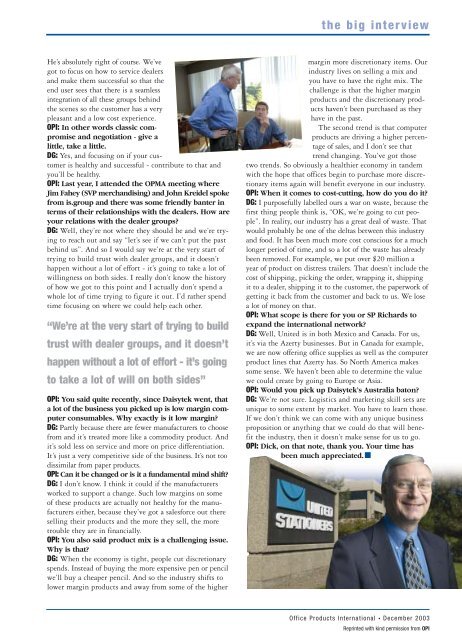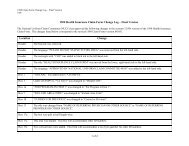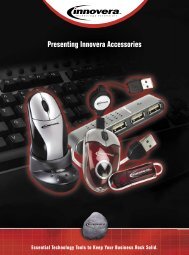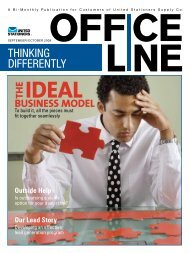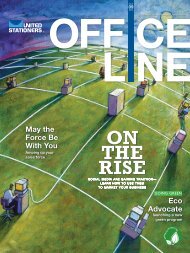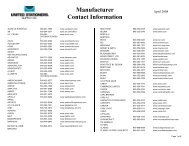OPI-Dick Gochnauer Interview - Ussco.com
OPI-Dick Gochnauer Interview - Ussco.com
OPI-Dick Gochnauer Interview - Ussco.com
You also want an ePaper? Increase the reach of your titles
YUMPU automatically turns print PDFs into web optimized ePapers that Google loves.
the big interview<br />
He’s absolutely right of course. We’ve<br />
got to focus on how to service dealers<br />
and make them successful so that the<br />
end user sees that there is a seamless<br />
integration of all these groups behind<br />
the scenes so the customer has a very<br />
pleasant and a low cost experience.<br />
<strong>OPI</strong>: In other words classic <strong>com</strong>promise<br />
and negotiation - give a<br />
little, take a little.<br />
DG: Yes, and focusing on if your customer<br />
is healthy and successful - contribute to that and<br />
you’ll be healthy.<br />
<strong>OPI</strong>: Last year, I attended the OPMA meeting where<br />
Jim Fahey (SVP merchandising) and John Kreidel spoke<br />
from is.group and there was some friendly banter in<br />
terms of their relationships with the dealers. How are<br />
your relations with the dealer groups?<br />
DG: Well, they’re not where they should be and we’re trying<br />
to reach out and say “let’s see if we can’t put the past<br />
behind us”. And so I would say we’re at the very start of<br />
trying to build trust with dealer groups, and it doesn’t<br />
happen without a lot of effort - it’s going to take a lot of<br />
willingness on both sides. I really don’t know the history<br />
of how we got to this point and I actually don’t spend a<br />
whole lot of time trying to figure it out. I’d rather spend<br />
time focusing on where we could help each other.<br />
“We’re at the very start of trying to build<br />
trust with dealer groups, and it doesn’t<br />
happen without a lot of effort - it’s going<br />
to take a lot of will on both sides”<br />
<strong>OPI</strong>: You said quite recently, since Daisytek went, that<br />
a lot of the business you picked up is low margin <strong>com</strong>puter<br />
consumables. Why exactly is it low margin?<br />
DG: Partly because there are fewer manufacturers to choose<br />
from and it’s treated more like a <strong>com</strong>modity product. And<br />
it’s sold less on service and more on price differentiation.<br />
It’s just a very <strong>com</strong>petitive side of the business. It’s not too<br />
dissimilar from paper products.<br />
<strong>OPI</strong>: Can it be changed or is it a fundamental mind shift?<br />
DG: I don’t know. I think it could if the manufacturers<br />
worked to support a change. Such low margins on some<br />
of these products are actually not healthy for the manufacturers<br />
either, because they’ve got a salesforce out there<br />
selling their products and the more they sell, the more<br />
trouble they are in financially.<br />
<strong>OPI</strong>: You also said product mix is a challenging issue.<br />
Why is that?<br />
DG: When the economy is tight, people cut discretionary<br />
spends. Instead of buying the more expensive pen or pencil<br />
we’ll buy a cheaper pencil. And so the industry shifts to<br />
lower margin products and away from some of the higher<br />
margin more discretionary items. Our<br />
industry lives on selling a mix and<br />
you have to have the right mix. The<br />
challenge is that the higher margin<br />
products and the discretionary products<br />
haven’t been purchased as they<br />
have in the past.<br />
The second trend is that <strong>com</strong>puter<br />
products are driving a higher percentage<br />
of sales, and I don’t see that<br />
trend changing. You’ve got those<br />
two trends. So obviously a healthier economy in tandem<br />
with the hope that offices begin to purchase more discretionary<br />
items again will benefit everyone in our industry.<br />
<strong>OPI</strong>: When it <strong>com</strong>es to cost-cutting, how do you do it?<br />
DG: I purposefully labelled ours a war on waste, because the<br />
first thing people think is, “OK, we’re going to cut people”.<br />
In reality, our industry has a great deal of waste. That<br />
would probably be one of the deltas between this industry<br />
and food. It has been much more cost conscious for a much<br />
longer period of time, and so a lot of the waste has already<br />
been removed. For example, we put over $20 million a<br />
year of product on distress trailers. That doesn’t include the<br />
cost of shipping, picking the order, wrapping it, shipping<br />
it to a dealer, shipping it to the customer, the paperwork of<br />
getting it back from the customer and back to us. We lose<br />
a lot of money on that.<br />
<strong>OPI</strong>: What scope is there for you or SP Richards to<br />
expand the international network?<br />
DG: Well, United is in both Mexico and Canada. For us,<br />
it’s via the Azerty businesses. But in Canada for example,<br />
we are now offering office supplies as well as the <strong>com</strong>puter<br />
product lines that Azerty has. So North America makes<br />
some sense. We haven’t been able to determine the value<br />
we could create by going to Europe or Asia.<br />
<strong>OPI</strong>: Would you pick up Daisytek’s Australia baton?<br />
DG: We’re not sure. Logistics and marketing skill sets are<br />
unique to some extent by market. You have to learn those.<br />
If we don’t think we can <strong>com</strong>e with any unique business<br />
proposition or anything that we could do that will benefit<br />
the industry, then it doesn’t make sense for us to go.<br />
<strong>OPI</strong>: <strong>Dick</strong>, on that note, thank you. Your time has<br />
been much appreciated.<br />
Office Products International • December 2003<br />
Reprinted with kind permission from <strong>OPI</strong>


